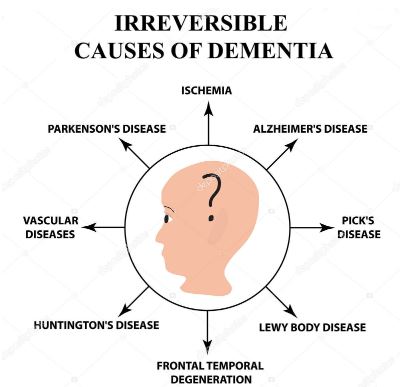Senile dementia: Definition and Symptoms
Senile dementia is one of the most common terms to refer to dementia that appears in advanced ages, and that is characterized by an affectation of cognitive abilities. These skills include attention, memory, language, etc. It is different from normal senility in older people that is characterized by a gradual loss of memory, other cognitive abilities and some striking personality changes.

The two best-known types of senile dementia are Alzheimer’s type of dementia and dementia caused by vascular problems.
Senile Dementia: Symptoms
Some of the symptoms present in the early stages of dementia are:
- Forget about recent events (distant or old memories are also forgotten when dementia is in more advanced stages).
- Difficulties of reasoning, calculation, and adaptation.
- Confusion about time, places, addresses, etc.
- Alterations in the trial
- Personality changes
In the intermediate stages of dementia, some symptoms are:
- Loss of cognitive skills such as learning, reasoning, and judgment
- Emotional instability, irascibility, agitation …
- Need for some help to perform basic activities of daily life.
- Night and daily confusion, and may affect the sleep of people living with the person with dementia.
Symptoms of the final phase in senile dementia:
- Loss of all cognitive abilities
- Inability to self-care, such as eating, bathing …
- Absence of personal hygiene
- Incontinence
- Gradual weight loss
- Walking unstable until finally falling
Phases of dementia
Health professionals often talk about phases of dementia to refer to the progression of the disease. Defining dementia in phases helps doctors determine the most appropriate guidelines. There are numerous scales, the most commonly used is the Reisberg Global Deterioration Scale (GDS), which establishes 7 phases of dementia depending on the degree of cognitive impairment. This makes it suitable for dementias such as Alzheimer’s and not so much for those in which there is not a great affectation of cognitive skills such as frontotemporal dementia.
The 7 phases established by the GDS are:
Phase 1. No dementia. No cognitive impairment
In this phase the person works normally, there are no subjective complaints of memory and he has good mental health.
Phase 2. No dementia. Very slight cognitive impairment
The person presents forgetfulness associated with aging. For example, forgetting names and familiar objects. But these losses are so slight that they are not perceived by family members or doctors. The affectation is not clinical, they are forgotten normal.
Phase 3. No dementia. Mild cognitive impairment
In this phase there is already an increase in forgetfulness, more difficulty concentrating and decreased activity. The person may get lost at some time or present difficulties in finding the right words. It is in this phase when family members begin to perceive the symptoms in the person. It can start 7 years before the onset of dementia.
Phase 4. Early dementia. Moderate cognitive impairment
This phase includes problems concentrating, memory loss of recent events and difficulties managing money or traveling alone to new places. The person has difficulty performing complex tasks efficiently or accurately and may deny any of the symptoms. They can isolate themselves from their family or friends since socialization becomes very complicated. In this phase, doctors can detect cognitive problems clearly during an interview or evaluation. This phase can last on average 2 years.
Phase 5. Moderately severe cognitive impairment
More severe memory deficits appear here and help from others to perform basic activities of daily living (dressing, bathing, preparing food) is necessary. The memory leaks are more common and interfere more in life. For example, don’t remember your address, phone number or don’t know what time of day it is. This phase can last on average 1.5 years.
Phase 6. Severe cognitive impairment
Total assistance is needed to carry out activities of daily living. There are forgetting names of close people, difficulty counting, finishing tasks and memory deficits about recent events (you can remember only some details of the first years of his life). Incontinence is a problem in this phase. Speech is also very affected and personality changes, illusions (believe that something is true or real when it is not), compulsions (repeat a simple behavior, such as cleaning) or anxiety and agitation. This average phase can last for 2.5 years.
Phase 7. Late dementia. Very serious cognitive impairment
The person no longer has the ability to speak or communicate, needs assistance for basic aspects such as going to the bathroom or eating and presents a loss of psychomotor skills, such as walking. The duration of this phase can be 2.5 years.
Senile dementia: treatment and prevention
Senile dementia caused by depression, poor nutrition, thyroid dysfunction, alcoholism can be corrected if these underlying problems are treated.
Alzheimer’s and vascular dementia are degenerative diseases and today there is no effective treatment. It is better to recognize the early symptoms of the disease so that the person can be evaluated and diagnosed in order to begin to carry out guidelines and take some type of medication that favors the slowing of the disease progress.
If you recognize the symptoms of senile dementia in a family member, some steps are as follows:
- Consult the doctor to confirm the diagnosis.
- Participate in self-help groups of relatives of people with senile dementia. This can help you relieve the pressure of caring for a person with dementia since to take care of a dependent person you must first be well. That’s why you should try to avoid caregiver burnout syndrome or caregiver syndrome.
- Use the resources available to you: home help, day centers, etc.
- Discuss the situation with the rest of your family or close people, so that there is greater compression from the environment.
- Make necessary changes at home to prevent accidents.
- Establish a daily routine to reduce feelings of confusion.
There is currently no effective way to prevent Alzheimer’s type of dementia. However, vascular dementia is due to vascular problems and can be prevented through healthy lifestyle habits.
You May Also Like:
Recent Posts
Types of Cells
Living things are made up of cells, the basic unit of life. There are many types…
What is the Difference Between HIV and AIDS?
The difference between HIV and AIDS is that AIDS is the disease caused by HIV infection. You…
What is Difference between Antisepsis and asepsis?
The Difference between Antisepsis and asepsis is that The antisepsis is the procedure performed to reduce…
Virus vs bacteria
Virus vs bacteria: The difference between viruses and bacteria lies in the fact that the virus…
What is Difference between Arches and bacteria?
Major Difference between Arches and bacteria is that The archaea and bacteria are prokaryotes, unicellular living whose genetic material…
What is The Difference Between DNA and RNA?
The difference between DNA and RNA is that DNA is deoxyribonucleic acid and RNA is…
